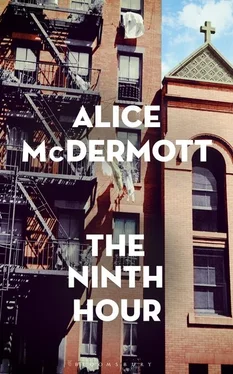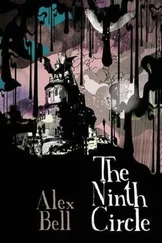Sally took a third sip. The taste was the taste of her mother’s warm finger, dipped into a capful of whiskey and rubbed against her gums.
The girl said she just walked out of her mother’s apartment this morning, tried to pawn her wedding ring (she held up her ringless hand), which turned out to be gold-plated, not gold. She shrugged. She went back to her mother’s place and looked around. Her mother had a silver tea service they never used. Never. Not once. Just sitting there. She took the tea service back to the pawnshop and got enough to buy her ticket. And here she was.
“I bet you think I’m something awful to steal from my own mother,” she said from behind her teacup. “But I know I’m going to send the money back as soon as I can. And I swear to you on a stack of Bibles, my mother never once used that teapot.”
“I don’t think you’re awful,” Sally said softly.
The girl was saying she had a very nice sleeping berth, and asked if Sally had a sleeping berth, clucking her tongue sympathetically when she said no. She was a pretty girl with a small face, pale brown hair, a tiny mouth that hung open when she wasn’t talking. She seemed puzzled when Sally told her she was on her way to the novitiate, and then shrugged when Sally explained this meant she was going to be a nun.
“I’m not Catholic,” the girl said, suddenly dull-eyed, without interest.
When the white-jacketed waiter brought the checks, the girl reached across the table and took Sally’s wrist. She began to speak urgently across the small space. Once more, Sally wondered if she had misjudged a stranger’s age. “Help me out,” the girl said. “I haven’t got any more money. Now they’ll throw me off the train.”
Sally had the five dollars in her wallet, the fifty more pinned to the lining of her purse, meant to be given to the Sisters on her arrival. She smiled as Sister Jeanne would have smiled and put two bills on the little silver tray to cover the girl’s dinner.
But then the girl took her wrist once again.
“If you’ve got a little more,” she said, and paused, and then said in a rush, “What I mean is, if you could lend me a little more. If you’ve got it.” Her grip tightened. “See, I don’t know how I’ll get to the hotel. Maybe there’s a subway or something. I don’t know. And if my husband isn’t there, I don’t know what I’ll do. Where I’ll stay. What if I can’t find him? What will happen to me? I’ll be out on the street.”
The girl pressed her fingertips into Sally’s flesh. Her nails were bitten.
“I’m sure your husband will be there,” Sally said, trying to soothe her. It was the voice she had used with Mrs. Costello. “He sent you the letter.” But she was thinking of Mrs. Tierney’s purloined stationery.
The girl leaned even farther over the small table, pressing her breasts against the narrow wood. The ripped veil of her hat seemed to rise up, to reach out imploringly, a beggar’s thin hand. “But what will I do if he’s not?” she said. “Can’t you just lend me something? A little more?” She eyed Sally’s purse. “I swear I’ll pay you right back,” cooing it. And now her voice grew to a whine. “What will I do out on the street?”
Sally recognized, reluctantly, what was happening here: her vocation was being tested. First the dirty woman with her vulgar talk, and now this girl. It hardly seemed fair that God would measure her worth so soon. She thought of Sister Lucy, who had wanted a contemplative’s life. Who did not refuse.
Unhappily, Sally said, “All right.” She extricated her hand from the girl’s clammy grip. She opened her pocketbook and reached into the slim tear behind the satin lining, felt for the safety pin, aware of the girl studying her all the while. She knew she should have the grace to give the girl all she had, as Christ would have done. Certainly as Sister Jeanne would have done. She knew the Sisters in Chicago would applaud her generosity. But she knew, too, that she didn’t want to. Didn’t want to give up what her mother had so carefully saved. Didn’t want—even more fiercely—to be mocked by another dirty stranger. She slid out two ten dollar bills and passed them across the table, fighting her own regret even as she gave them up. “That’s everything I have,” she said piously. Stubbornly. “That’s all I own.”
The girl reached for the money. “Write down your address,” she said, and took the receipt from the silver plate, pushing it toward her. “I’ll be there tomorrow to pay you back.”
She was tucking the bills into her own purse when she suddenly looked across the table. “I didn’t know nuns were allowed to have money,” she said. It seemed a reprimand.
As Sally was leaving the car, headed in the opposite direction from the Bronx girl, the white-jacketed waiter took her arm. “Pardon me, miss,” he said. “That lady a friend of yours?”
And Sally, somewhat breathlessly, as if he had caught her in a lie, said, “Yes.”
The man shook his head. He was a bald black man with large and sympathetic eyes. “I just hope she was no trouble to you,” he said kindly. “That’s all.”
Sally said, “Thank you.” She was about to walk on when she added, abruptly, as if to return his kindness, “My father worked on a train, too. The Brooklyn Rapid Transit.” She was surprised to find her tongue had grown thick.
The man smiled and nodded. This might have been something he already knew. “Is your father with you tonight?” he asked.
And she said, “Oh yes,” the two words running together sloppily. She indicated the open corridor. “He’s just back there,” she said. And imagined him briefly, a man with a fedora pulled over his eyes.
The porter said, “You both have a nice evening, then.”
When she returned to her seat, her companion was once again chuckling inside her panting breath—no telling at what.
Outside, there were only small bits of light, moth holes, as she thought of them, in the heavy darkness. The taste of the sweet tea, the aftermath of the alcohol, lingered at the back of her throat, made her eyes ache. She leaned her head against the window.
The stations they pulled into were a relief at first, golden and bustling, but as the hour grew late and she woke from a shallow sleep to see them, they offered only a yellowed, nightmare tableau of weary shadows: a lonely stationmaster lifting a heavy arm, a single passenger with a suitcase and an abandoned air, a newspaper blown against a wall. Weary shadows that were quickly lost again as the train moved on, into the cavernous night.
Her father was a trainman on the BRT.
All her life, as she moved over bright sidewalks and green grass, he had been in his coffin, the narrowest of corridors—of lightless tunnels meant to keep out rock and stone and damp earth. Why had she never thought of this before? Why had she never pictured him there as she blithely went up and down the subway stairs, rode nonchalantly through the darkness. A trainman on the BRT, now long returned to the place where he had plied his trade: the damp underground, the dirt and carved stone, the brittle dark.
At one point, she woke to see the little boy standing in the aisle again. Her companion slept lifelessly beside her. He swayed with the movement of the train. Even in the dimmed light, now thick with smoke, she could see the goose egg on his bald skull. As he shifted with the train’s shuddering, she could see a line of dried blood on his cheek just below it. She had only half her chocolate bar left, but she found it in her purse and handed it across the bulk of her seatmate to the child. He took it from her and then, wraithlike, walked on. His mother’s head was slumped into the window.
She was going to give her life to others, in the name of the crucified Christ and His loving mother. She was going to join the Little Nursing Sisters of the Sick Poor, Congregation of Mary Before the Cross, Stabat Mater , which Sister Jeanne thought the most beautiful name of all the orders. Because it reminded us all, Sister Jeanne said, that love stood before brutality in that moment on Golgotha and love was triumphant. Love applied to suffering, as Sister Illuminata put it: like a clean cloth to a seeping wound.
Читать дальше










